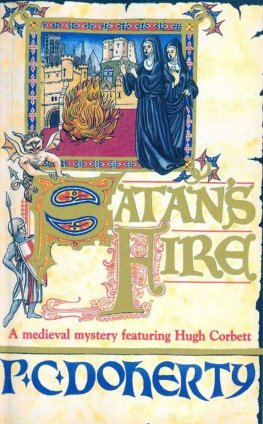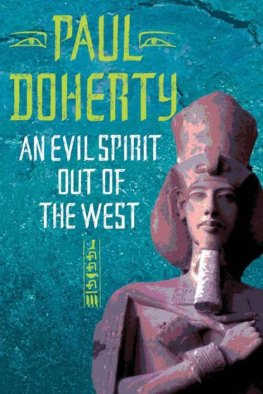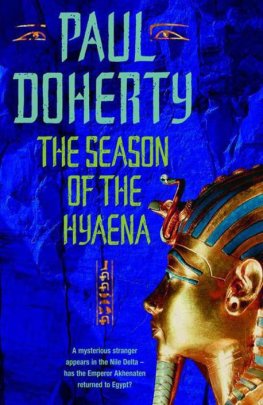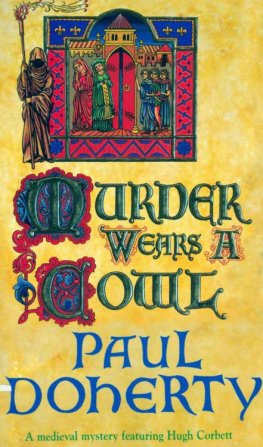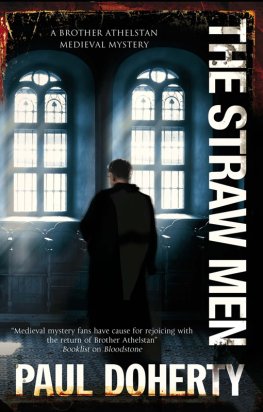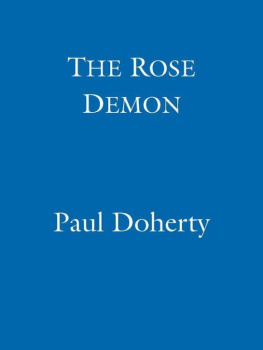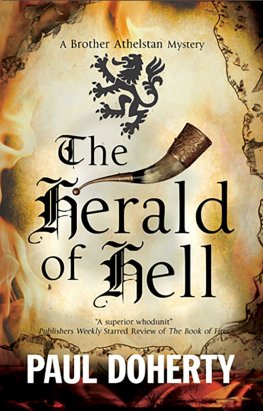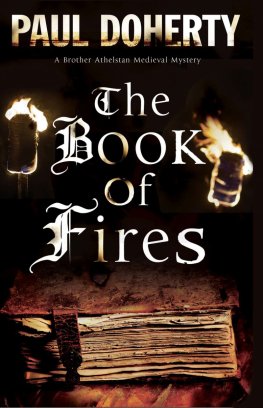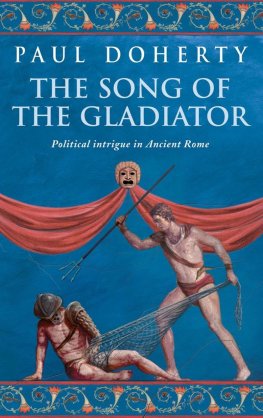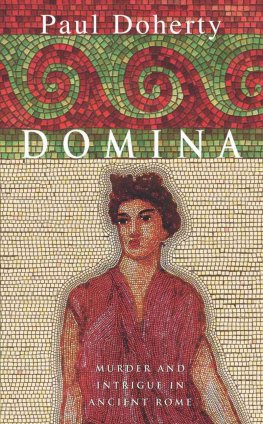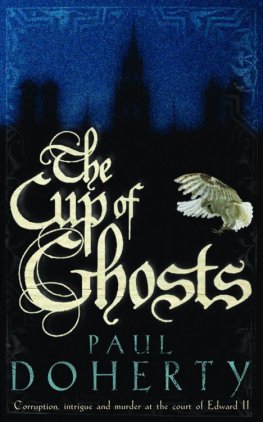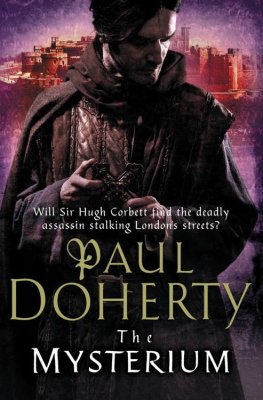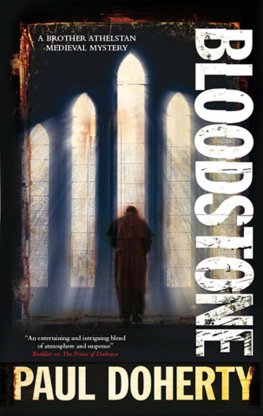Paul Doherty - Satan's Fire
Here you can read online Paul Doherty - Satan's Fire full text of the book (entire story) in english for free. Download pdf and epub, get meaning, cover and reviews about this ebook. year: 2012, publisher: Headline, genre: Detective and thriller. Description of the work, (preface) as well as reviews are available. Best literature library LitArk.com created for fans of good reading and offers a wide selection of genres:
Romance novel
Science fiction
Adventure
Detective
Science
History
Home and family
Prose
Art
Politics
Computer
Non-fiction
Religion
Business
Children
Humor
Choose a favorite category and find really read worthwhile books. Enjoy immersion in the world of imagination, feel the emotions of the characters or learn something new for yourself, make an fascinating discovery.
- Book:Satan's Fire
- Author:
- Publisher:Headline
- Genre:
- Year:2012
- ISBN:9780755350360
- Rating:5 / 5
- Favourites:Add to favourites
- Your mark:
- 100
- 1
- 2
- 3
- 4
- 5
Satan's Fire: summary, description and annotation
We offer to read an annotation, description, summary or preface (depends on what the author of the book "Satan's Fire" wrote himself). If you haven't found the necessary information about the book — write in the comments, we will try to find it.
Satan's Fire — read online for free the complete book (whole text) full work
Below is the text of the book, divided by pages. System saving the place of the last page read, allows you to conveniently read the book "Satan's Fire" online for free, without having to search again every time where you left off. Put a bookmark, and you can go to the page where you finished reading at any time.
Font size:
Interval:
Bookmark:
Paul Doherty
Satan's Fire
Prologue
On the shores of the Dead Sea, where the djinns and devils rested from their constant war against man, stood the rocky, yellow-stoned eyrie of Am Massafia; the stronghold lair of the Sheikh Al-Jebal, the Old Man of the Mountain. The trackways to the Old Mans lair were narrow, winding and secret, the shadow of vultures wings a constant presence. The final path, a perilous journey along a roped bridge above a yawning gorge, was guarded by Sudanese swordsmen with broad, razor-edged scimitars clasped to their waists. Once across this bridge of hell, however, and through the iron-studded gates, a visitor would enter a palace with mosaic floors. Cool courtyards, with fountains spouting ice-cold water, offered shade against the setting sun. Peacocks strutted and gaily coloured parrots shrieked amongst the rose gardens or rustled the leaves of the dark mulberry trees. Around the courtyard, wooden lattices, built against the wall, were covered with rare and exotic flowers which turned the dry air heavy with perfume, whilst thuribles, in corners or on shelves, poured amber smoke to the ever-blue sky.
Beneath the fortress, however, lay a different place: dark, hot passageways; galleries without light or air; only the occasional torch flickering against the blood-red rock. The dungeons of the Old Man of the Mountain housed many prisoners. Some had long died, the flesh falling off their bones which now turned yellow in the heat. Others had gone insane and crouched like animals in their narrow chained dungeons, crawling around like dogs, their eyes mad, their tongues constantly baying against the darkness. But, in one cell, the Unknown, the infidel knight with corn-coloured hair and light-blue eyes, squirmed on rotting straw and dreamed of vengeance. For only this, burning brightly within him, held back the Stygian blackness and the demons ever ready to carry away his soul. Hatred, anger and a burning desire for vengeance kept his wits together and body and soul as one. He refused to dwell on the silent horrors around him but lived constantly in the past, on that dreadful night when the great city of Acre had fallen to the Turks. Again and again he would recall the constant beat of the kettledrums as the Muslim hordes poured through the breach in the wall of the city. The armoured regiments of Mamelukes streaming across the ruined moat, over the bodies and broken engines, pressing back the wounded knights, forcing their way into the streets. The prisoner blinked and, lifting his arm, stared closely at the white scabs forming on his arms and legs. He closed his eyes and called on God for life: not a cure for his leprosy but length of days and the opportunity to wreak his revenge.
In the opulent, breeze-filled chambers far above the dungeon, the Sheikh Al-Jebal, the Old Man of the Mountain, sat overlooking a walled garden with marble fountains which tossed sparkling wine into the perfumed air. The Old Man, his eyes heavy with opium, stared down at the silk-carpeted pavilions and beautifully tiled porticoes, where his young men lay sprawled with their Circassian girls and dreamed hashish-filled fantasies of Paradise. So it was, every day, a time of Paradise until the Old Man issued his orders. Once the die had been cast, these young men, dressed in their white robes, red girdles about their waists, scarlet, gold-tipped slippers on their feet, would leave the fortress and go down into the valleys to wreak their masters will. No one could ever oppose him. No one ever escaped his death sentence. Two daggers pressed into the pillows of their intended victims bed and, on the table beside it, a flat seedcake, a warning from the Old Man of the Mountain that his Assassins were about to do his will.
The Old Man turned, shifting his body on the purple silk divan between the naked, golden bodies of his concubines. They murmured in their drug-filled sleep whilst he stared up at the ceiling of the chamber, hard cedarwood, inlaid with gold and fresh diamonds. He felt restless and sat up, gazing round the room at the inanimate birds fashioned out of gold and silver with enamel feathers and brilliant ruby eyes. The sheikhs hand went out to the table next to the bed where gold dishes and amber cups stood, filled with the sweetest wines or ripest fruit. He let his hand fall. He had drunk and eaten enough. He was bored and the affairs of men required his attention.
What does it profit a man, Sheikh Al-Jebal murmured, quoting the Christians, if he gains the whole world but suffers the loss of his immortal soul?
Yesterday messengers had arrived bringing news of the outside world; whispers from the busy markets of Alexandria, Tripoli, and even further west, from the land of the infidels. From Rome, Avignon, Paris and London. The sheikh got off the divan. He stretched and a slave, standing in the corner, hurried across, a white gauze cloak in his hands, he carefully wrapped this round his masters shoulders. The Old Man ignored him as if the slave didnt even exist. He walked across to a small alcove, pulling back the double-edged curtain of gold-embossed leather and stared down at the ivory chessmen.
It is the will of Allah! He murmured. It is the will of Allah that I intervene in the game.
He picked up the figure of the king and, cradling it against his cheek, went and sat on his throne-like chair. He thought of the infidel kings of the west: Edward of England, Philip of France, as well as his inveterate enemies, those monk-soldiers, the Templars, with their red crosses, great castles and immense power. He played with the figure of the king and smiled lazily.
It is time to go down, he murmured, among the sons of men.
England and France were on the verge of signing a great peace; the Templar order, ever ready, might exploit this peace and turn the eyes of the Western kings and princes to the regaining of Jerusalem and its Holy Places. Once again the fleets of Venice, Genoa and Pisa would be seen off the Palestine coast. The Templars would reprovision their castles and the great iron-mailed knights of the West would pour ashore to plant their standards above Acre, Damascus, Tripoli and Sidon, turning the whole coastline into a sea of blood. And there were other whispers. Strange stories, things the Old Man of the Mountain could hardly believe but hoped to act upon. He closed his eyes and whispered the three sacred messages of the Assassins, always dispatched to every one of their victims.
KNOWEST THOU, THAT WE GO FORTH AND RETURN AS BEFORE AND BY NO MEANS CAN YOU HINDER US.
KNOWEST THOU, THAT WHAT THOU POSSESSES SHALL ESCAPE THEE IN THE END AND RETURN TO US.
KNOWEST THOU, THAT WE HOLD YOU AND WILL KEEP THEE UNTIL THE ACCOUNT BE CLOSED.
He opened his eyes. Few men escaped such a message. Only one, Edward of England, whilst crusading in Palestine in the months before he became king: a poisoned knife plunged into his shoulder but, through Gods grace as well as the attentions of his wife, Edward had recovered from the poison. The Old Man of the Mountain played with the rings on his fingers. He must act on the secrets hed learnt. But how, he wondered, could assassins be sent to Edwards cold, misty isle? He toyed with the rings, watching the light dance on the precious stones, then lifted his head: there were more ways to sting a man than use a scorpion.
Bring up the prisoner! he whispered into the scent-filled air. Release the Infidel, the knight we call the Unknown. He will do my bidding!
Some three months later, Dames Cecilia and Marcia of the Order of St Benedict were journeying along the old Roman road leading to the gate known as Botham Bar at York. The daylight had died. Darkness was beginning to shroud the damp forests on either side of the road. The two good sisters, swathed in their brown, woollen robes, each riding one of their convents best palfreys, gossiped to hide their own concern. They were not truly frightened. Their guide, Thurston of Guiseborough, striding ahead in front of them, was a burly, thickset peasant. He carried a short, small buckler on his back, sword and dagger were clasped to his belt, and his burly fist held a club which would have dimmed the brains of an ox. Nevertheless, the two good sisters liked to frighten each other. Now and again, they would glance hurriedly sideways at the damp trees and recall the tales about how the Romans had built this road. How, in the cold, wet forest beyond, the ghosts of these ancient people clustered in the vine-covered ruins where the owl, fox and badger made their nests.
Font size:
Interval:
Bookmark:
Similar books «Satan's Fire»
Look at similar books to Satan's Fire. We have selected literature similar in name and meaning in the hope of providing readers with more options to find new, interesting, not yet read works.
Discussion, reviews of the book Satan's Fire and just readers' own opinions. Leave your comments, write what you think about the work, its meaning or the main characters. Specify what exactly you liked and what you didn't like, and why you think so.

